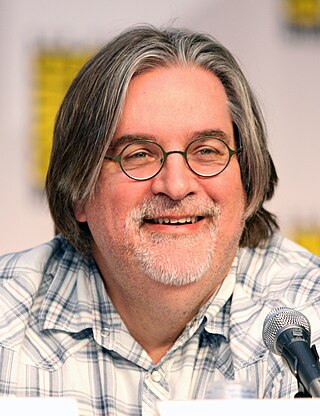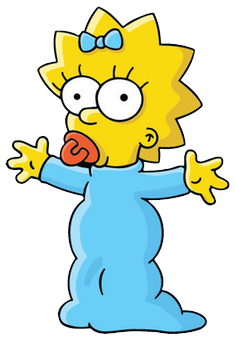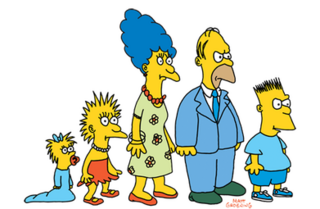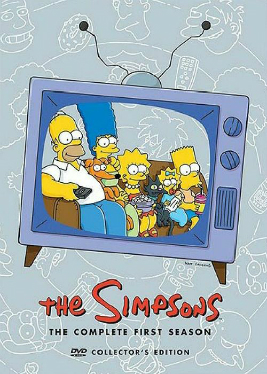
Matthew Abram Groening is an American cartoonist, writer, producer, and animator. He is best known as the creator of the comic strip Life in Hell (1977–2012) and the television series The Simpsons (1989–present), Futurama, and Disenchantment (2018–2023). The Simpsons is the longest-running U.S. primetime television series in history and the longest-running U.S. animated series and sitcom.
Marjorie Jacqueline "Marge" Simpson (née Bouvier) is a character in the American animated sitcom The Simpsons and part of the eponymous family. Voiced by Julie Kavner, she first appeared on television in The Tracey Ullman Show short "Good Night" on April 19, 1987. Marge was created and designed by cartoonist Matt Groening while he was waiting in the lobby of James L. Brooks' office. Groening had been called to pitch a series of shorts based on Life in Hell but instead decided to create a new set of characters. He based the character on his mother Margaret Groening. After appearing on The Tracey Ullman Show for three seasons, the Simpson family received their own series on Fox, which debuted December 17, 1989.

Homer Jay Simpson is the protagonist of the American animated sitcom The Simpsons. He is voiced by Dan Castellaneta and first appeared, along with the rest of the Simpsons, in The Tracey Ullman Show short "Good Night" on April 19, 1987. Homer was created by the cartoonist Matt Groening while he was waiting in the lobby of producer James L. Brooks's office. Groening had been called to pitch a series of shorts based on his comic strip Life in Hell but instead created a new set of characters. He named the character after his father, Homer Groening. After appearing for three seasons on The Tracey Ullman Show, the Simpsons received their own series on Fox, which debuted on December 17, 1989.

Margaret Lenny "Maggie" Simpson is a fictional character in the animated television series The Simpsons and the youngest member of the Simpson family. She first appeared on television in the Tracey Ullman Show short "Good Night" on April 19, 1987. Maggie was created and designed by cartoonist Matt Groening while he was waiting in the lobby of James L. Brooks' office. She received her first name from Groening's youngest sister. After appearing on The Tracey Ullman Show for three years, the Simpson family was given their own series on the Fox Broadcasting Company which debuted December 17, 1989.

Bartholomew Jojo "Bart" Simpson is a fictional character in the American animated television series The Simpsons and part of the Simpson family. He is voiced by Nancy Cartwright and first appeared on television in The Tracey Ullman Show short "Good Night" on April 19, 1987. Cartoonist Matt Groening created and designed Bart while waiting in the lobby of James L. Brooks' office. Groening had been called to pitch a series of shorts based on his comic strip, Life in Hell, but instead decided to create a new set of characters. While the rest of the characters were named after Groening's family members, Bart's name is an anagram of the word brat. After appearing on The Tracey Ullman Show for two years, the Simpson family received its own series on Fox, which debuted December 17, 1989. Bart has appeared in every Simpsons episode except "Four Great Women and a Manicure".

Barnard "Barney" Gumble is a recurring character in the American animated TV series The Simpsons. He is voiced by Dan Castellaneta and first appeared in the series premiere episode "Simpsons Roasting on an Open Fire".

Santa's Little Helper is a fictional dog in the American animated television series The Simpsons. He is the pet greyhound of the Simpson family. He was previously voiced by Frank Welker, and is currently voiced by Dan Castellaneta. The dog was introduced in the first episode of the show, the 1989 Christmas special "Simpsons Roasting on an Open Fire", in which his owner abandons him for finishing last in a greyhound race. Homer Simpson and his son Bart, who are at the race track in hope of winning some money for Christmas presents, see this and decide to adopt the dog.
"Homer's Odyssey" is the third episode of the American animated television series The Simpsons. It originally aired on the Fox Network in the United States on January 21, 1990. In this episode, Homer becomes a crusader for safety in Springfield and is promoted to safety inspector at Springfield Nuclear Power Plant. The episode was written by Jay Kogen and Wallace Wolodarsky and was the first Simpsons script to be completed, although it was the third episode produced.

The Itchy & Scratchy Show is a fictional animated series featured on The Simpsons. The cartoon depicts a blue mouse named Itchy, and a black cat named Scratchy, who repeatedly maim or kill each other. It is typically presented as 15- to 60-second shorts that are a part of The Krusty the Clown Show. Itchy & Scratchy is filled with graphic violence that almost invariably prompts laughter from The Simpsons characters, especially Bart and Lisa.
"Marge Be Not Proud" is the eleventh episode of the seventh season of the American animated television series The Simpsons. It originally aired on the Fox network in the United States on December 17, 1995, exactly six years after the series premiere episode "Simpsons Roasting on an Open Fire". In the episode, Marge refuses to buy Bart the new video game Bonestorm, so he steals it from a local discount store. Bart is estranged from his mother after he gets caught, so he works to regain her love and trust.

The Simpsonsshorts are a series of animated short films that aired as a recurring segment on Fox variety television series The Tracey Ullman Show for three seasons, before the characters spun off into The Simpsons, their own half-hour prime-time show. They feature Homer, Marge, Bart, Lisa, and Maggie, and a few secondary characters. The series was created by Matt Groening, who designed the Simpson family and wrote many of the shorts. The shorts first aired on April 19, 1987 starting with "Good Night". The final short to air was "TV Simpsons", originally airing on May 14, 1989. The Simpsons later debuted on December 17, 1989, as an independent series with the Christmas special "Simpsons Roasting on an Open Fire".
"Life on the Fast Lane", also known as "Jacques to Be Wild" in the UK, is the ninth episode of the American animated television series The Simpsons. It originally aired on the Fox network in the United States on March 18, 1990. It was written by John Swartzwelder and directed by David Silverman. Albert Brooks guest starred as Jacques, a French bowling instructor, with him being credited as "A. Brooks".

"Some Enchanted Evening" is the thirteenth and final episode of the first season of the American animated television series The Simpsons. It was originally broadcast on the Fox network in the United States on May 13, 1990. Written by Matt Groening and Sam Simon and directed by David Silverman and Kent Butterworth, "Some Enchanted Evening" was the first episode produced for season one and was intended to air as the series premiere in fall 1989, but aired as the season one finale due to animation problems. The Christmas special "Simpsons Roasting on an Open Fire" premiered in its place on December 17, 1989. It is the last episode to feature the original opening sequence starting from "Bart the Genius". In the episode, Homer and Marge go on a night out while leaving the children under the care of a diabolical babysitter named Ms. Lucille "Botz" Botzcowski.

The Simpson family are the main fictional characters featured in the animated television series The Simpsons. The Simpsons are a nuclear family consisting of married couple Homer and Marge and their three children, Bart, Lisa, and Maggie. They live at 742 Evergreen Terrace in the fictional town of Springfield, United States, and they were created by cartoonist Matt Groening, who conceived the characters after his own family members, substituting "Bart" for his own name. The family debuted on Fox on April 19, 1987, in The Tracey Ullman Show short "Good Night" and were later spun off into their own series, which debuted on Fox in the U.S. on December 17, 1989, and started airing in Winter 1989.
"Miracle on Evergreen Terrace" is the tenth episode of the ninth season of the American animated television series The Simpsons. It originally aired on the Fox network in the United States on December 21, 1997. Bart accidentally ruins Christmas for the Simpson family by burning down the tree and all their presents.
"Homer's Triple Bypass" is the eleventh episode of the fourth season of the American animated television series The Simpsons. It originally aired on the Fox network in the United States on December 17, 1992. In this episode, Homer suffers a heart attack due to his very poor health and diet. Dr. Hibbert tells Homer that he needs a triple bypass, but the Simpson family resorts to discount surgeon Dr. Nick after learning how expensive the operation would be in a regular hospital.

The first season of the American animated television series The Simpsons originally aired on the Fox network between December 17, 1989, and May 13, 1990, beginning with the Christmas special "Simpsons Roasting on an Open Fire". The executive producers for the first production season were Matt Groening, James L. Brooks, and Sam Simon.

The fifth season of the American animated television series The Simpsons originally aired on the Fox network between September 30, 1993, and May 19, 1994. The showrunner for the fifth production season was David Mirkin who executive produced 20 episodes. Al Jean and Mike Reiss executive produced the remaining two, which were both hold overs that were produced for the previous season. The season contains some of the series' most acclaimed and popular episodes, including "Cape Feare", "Lisa vs. Malibu Stacy", "Homer Goes to College", "Deep Space Homer", and "Rosebud". It also includes the 100th episode, "Sweet Seymour Skinner's Baadasssss Song". The season was nominated for two Primetime Emmy Awards and won an Annie Award for Best Animated Television Program as well as an Environmental Media Award and a Genesis Award. The DVD box set was released in Region 1 on December 21, 2004, Region 2 on March 21, 2005, and Region 4 on March 23, 2005.

Treehouse of Horror is a series of annual Halloween-themed anthology episodes of the animated sitcom The Simpsons. Also known as The Simpsons Halloween Specials, each episode typically consists of three separate, self-contained segments. Each segment involves the Simpson family in some comical horror, science fiction, or supernatural setting; plot elements operate beyond the show's normal continuity, with segments exaggeratedly more morbid and violent than a typical Simpsons episode. With 34 episodes as of 2023, each Treehouse of Horror episode is numbered in Roman numerals, one less than the respective season it is in.

The Simpsons is an American animated comedy franchise whose eponymous family consists of Homer, Marge, Bart, Lisa, and Maggie. The Simpsons were created by cartoonist Matt Groening for a series of animated shorts that debuted on The Tracey Ullman Show on Fox on April 19, 1987. After a three-season run, the sketch was developed into The Simpsons, a half-hour prime time show that was an early hit for Fox, becoming the first Fox series to land in the Top 30 ratings in a season (1989–1990). The popularity of The Simpsons has made it a billion-dollar merchandising and media franchise. Alongside the television series, the characters of the show have been featured in a variety of media, including books, comic books, a magazine, musical releases, and video games.
















